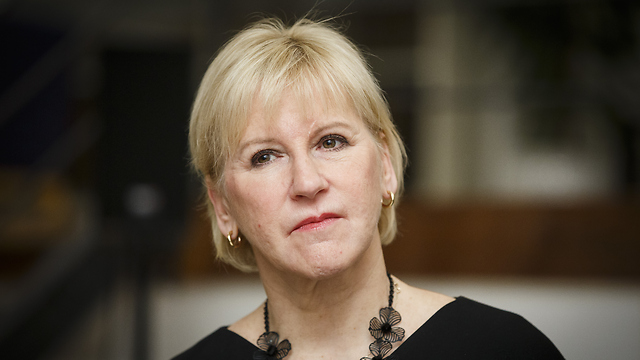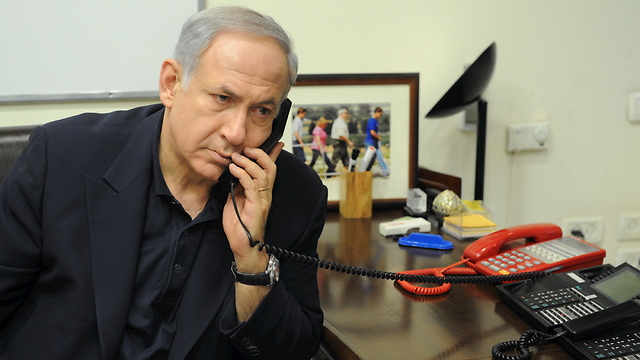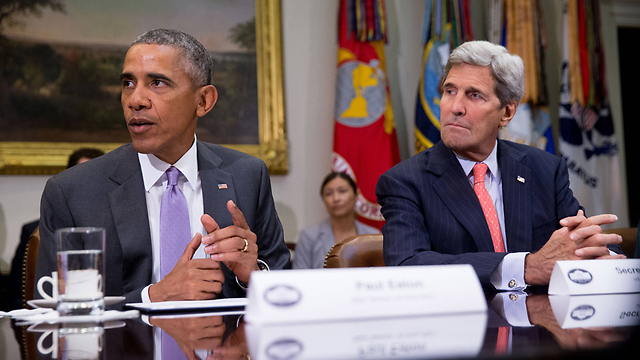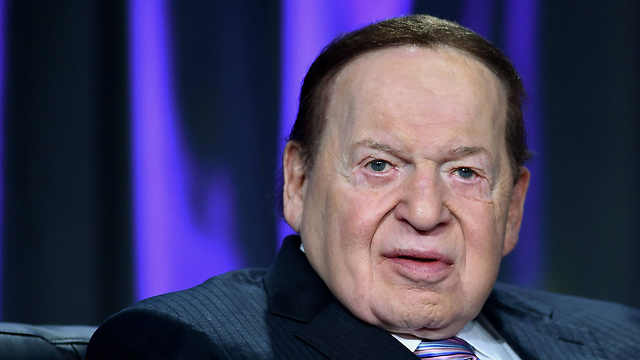The great democratizer
Op-ed: Netanyahu can sit more comfortably than ever now. His opponents from within and without are nowhere to be seen, his position seems secure, and his agenda is uninterrupted. So why does he still seem so uneasy?
One of Sasha Baron Cohen's famous films is called The Dictator. Its protagonist is Admiral General Haffaz Aladeen, the Gaddafi-style president of a fictitious Muslim country. One of the film's scenes has Aladeen explaining the virtues of dictatorship to the Americans. They think he's mocking Libya, but he's really mocking them.

"Imagine if America was a dictatorship. You could let one percent of the people have all the nation's wealth. You could help your rich friends get richer by cutting their taxes and bailing them out when they gamble and lose. You could ignore the needs of the poor for health care and education," the admiral general says, "Your media would appear free but would secretly be controlled by one person and his family. You could wiretap phones, you could torture foreign prisoners, you could have rigged elections. You could lie about why you go to war. You could fill your prisons with one particular racial group and no one would complain! You could use the media to scare the people into supporting policies that are against their interests. I know this is hard for you Americans to imagine, but please try."
I scratched out the word "Americans" and re-read the text. No, we're not there yet, but we're on our way. Every day brings us closer to the destination. Not Graceland, not Neverland, certainly not Altneuland. Bibiland.
A once-in-a-generation man
The free world's democratic regimes are currently in the midst of a crisis the likes of which hasn't been seen since the World War Two. The reasons are clear: A stable, comfortable age has ended, clearing the way for economic, social, and political uncertainty; governments can't handle the challenges that the new times are and the demands of the voting public are posing. Islamic terror; immigration waves from the third world to the first; demographic changes; corruption; the collapse of old political parties. Many long for someone strong, authoritative, who'll free the state from the ties that cripple it: The limits of the law, regulations, political correctness, the media's nosey criticism – someone who'll stand above politics. A once-in-a-generation man.The US isn't immune to these expectations. Donald Trump's popularity is the proof. The European Union's member states, some of them new democracies, certainly aren't immune. The anti-democratic bug brings old-style racism, the kind Europe would like to forget, back to the center of public discussions.
Netanyahu entered this age in a comfortable state. Maybe I'm wrong, but I think he can interpret things thusly: Islamic terrorism takes Palestinian affairs off the table, and that's a good thing. The Arab states are busy struggling to survive, and that's good too. European governments are simultaneously frightened of the Muslims and the rise of the anti-Muslim right. Other than the Swedish foreign minister, they don't have much interest in the Israel-Palestinian conflict. That's excellent.

Swedish Foreign Minister Margot Wallstrom. Other than her, European leaders don't currently have much interest in Israeli-Palestinian affairs. (Photo: Getty Images) (צילום: gettyimages)
America is busy with its elections, and that's good. The candidates of both parties are embracing Israel and its prime minister, and that's excellent. Within two-to-three months Obama will become a lame duck president, along with his Secretary of State Kerry. That's good.
American Deputy Secretary of Defense Robert Work was here this week. He met with Defense Minister Moshe Ya'alon and his associates, as well as the top IDF brass. Discussions focused on preserving Israel's qualitative advantage in the face of Iran and the Arab world. They were technical discussions. The memorandum of understanding, the agreement which is intended to determine the aid the US gives Israel in the coming decade, was hardly mentioned. The current aid deal is set to expire next month, which is why it was discussed so much before and after Netanyahu's visit to Washington. Netanyahu wanted to add the hundreds of millions of dollars that Israel receives for special projects such as the Iron Dome and Arrow missile defense systems to the permanent $3.1 billion aid package. Obama agreed.
And now, Netanyahu is in no hurry. He might want the agreement to be finalized during another visit of his to Washington, to the annual AIPAC conference on March 20; he might believe that the aid package can be increased further still. In his fourth term as prime minister, Netanyahu doesn't see a need to explain his decisions to the public. Like Putin, he's open to interpretation.
Speaking of the aid package, there's another story – both related and non-related. Politico is a highly-rated American news site. Recently, it published a fascinating profile of Denis McDonough. Among other things, the story states that in 2013, immediately after Congress approved a special aid package to Israel for the development of the Iron Dome system, then-Senate Majority Leader Harry Reid (D-Nevada) received a phone call from casino magnate and Netanyahu patron Sheldon Adelson. Adelson said he would be willing to give a billion dollars to the Iron Dome project, on the condition that the donation would be given through the American government. Reid enthusiastically phoned Obama.
Obama lost his wits for a moment. "What?!" he yelled at the Senator. When he calmed down, he proposed that Reid call Adelson, thank him, and explain that private funding of arms would create an unhealthy precedent. The idea died. Politico did not mention whether Adelson contacted the Israeli government directly with his generous offer.
From condemnation to embrace
Netanyahu has many other reasons to feel comfortable. The daily terror events in Israel and the West Bank are seen as a government problem. The Zionist Union has even attempted to start a campaign accusing the government of neglecting the problem. It can be interpreted otherwise. An interesting interplay has been created here, between Netanyahu and Palestinian President Mahmoud Abbas. The lone wolf terror attacks allow Abbas to claim that things happen, and the conflict is on the agenda. He doesn't have to split apart the Palestinian Authority or petition international bodies. On the other hand, he can say that he's foiling Hamas' efforts to perpetrate larger-scale attacks. Every speech Netanyahu gives, accusing him of being responsible for events, helps Abbas with his home crowd.Netanyahu can also see the glass as half-full. The Israeli public is leaning toward the right, which is good up to a certain point. The security concerns take the weight off other topics; they strengthen the loyalty of government coalition members and silence their bitterness; the goings-on in Israeli cities have not been substantially slowed down, and the effect on the economy is minor. They can be lived with.
The state of internal politics is even more comfortable. Netanyahu has no rivals on the horizon, he's competing against himself. The public can be for or against Netanyahu, but it doesn't have the option of supporting someone else.
Readers may ask: If things are so comfortable, why doesn't Netanyahu relax, why does he go from event to event, photo-op to photo-op, condemnation to embrace – why does he keep cultivating his cult of personality and encouraging anti-democratic steps? The answer is that utopia doesn't necessarily erase paranoia, not with Netanyahu and not with other politicians.
He's met everyone, and fought everyone, and connected with everyone, and stuck everyone out to dry. Along the way, he became a cynic. According to all signs, he insisted on fictitious elections for the leadership of the Likud party not because he was frightened of his opponents, but because he wanted to raise millions from foreign donors. He's not the only one: Naftali Bennett (Bayit Yehudi) did the same in his party, and ended up paying a fine. It's all calculated, all cynical. All based on the assumption that whatever didn't work yesterday will work tomorrow. As the old Ze'ev Jabotinsky poem says, "God, you have chosen us to rule."













